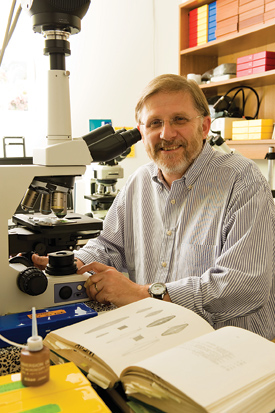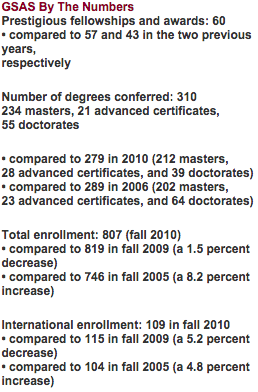Graduate School of Arts and Sciences
 In 2010-2011, the Graduate School of Arts and Sciences adopted a new set of five-year goals to coincide with its 100th anniversary in 2016. In pursuing these goals, the school conformed with several University priorities: encouraging a culture of evaluation and evidence-based decision making, capitalizing on existing strengths to use University resources efficiently, and effectively using information technology and new media. The pursuit of these five-year goals is expected to build the reputation of GSAS and its programs and bring them greater prominence among Catholic institutions.
In 2010-2011, the Graduate School of Arts and Sciences adopted a new set of five-year goals to coincide with its 100th anniversary in 2016. In pursuing these goals, the school conformed with several University priorities: encouraging a culture of evaluation and evidence-based decision making, capitalizing on existing strengths to use University resources efficiently, and effectively using information technology and new media. The pursuit of these five-year goals is expected to build the reputation of GSAS and its programs and bring them greater prominence among Catholic institutions.
Creating and strengthening
graduate programs
By developing several new programs, GSAS expanded the breadth of possible graduate study at Fordham. A proposal for a master of fine arts in theater with a concentration in playwriting was approved by the GSAS Council, the arts and sciences deans, and the New York State Department of Education. This highly selective two-year program is distinguished by students’ experience in all aspects of play production, and by the provision that students fully produce two plays during their course of study. Other programs being developed include a master of science in biomedical research, jointly offered with Albert Einstein College of Medicine, and an advanced certificate in public opinion and survey research, offered by the Department of Political Science.
 Distinctive, timely, and mission-appropriate graduate programs require outstanding matriculants, and GSAS demonstrated continued improvements in admissions and enrollment in 2010-2011. Application numbers have climbed steadily over the past four years, with the number of applications for master’s and doctoral programs each jumping by 10 percent from fall 2009 to fall 2010.
Distinctive, timely, and mission-appropriate graduate programs require outstanding matriculants, and GSAS demonstrated continued improvements in admissions and enrollment in 2010-2011. Application numbers have climbed steadily over the past four years, with the number of applications for master’s and doctoral programs each jumping by 10 percent from fall 2009 to fall 2010.
GSAS showed a 27 percent increase in the number of degrees and certificates granted over the previous year: 54 doctoral degrees (up 42 percent), 232 master’s degrees (up 12 percent), and 29 advanced certificates (up 16 percent). Among the diplomas awarded were the first master of arts degrees in ethics and society and the first advanced certificates in financial computing.
Cultivating the academic and professional development of students
The total number of achievements (external awards, publications, and presentations) by GSAS students increased 5 percent to 261. Several programs showed dramatic two-year increases in the percentage of students with at least one achievement: psychology (from 14 percent to 41 percent), English (from 15 percent to 34 percent), history (from 16 percent to 33 percent), and biology (from 12 percent to 26 percent). The tradition of outstanding external achievements continued with 80 prestigious national and international awards, including 15 to biology students, 11 to English students, and 21 to students in the International Political Economy and Development (IPED) program. Students published 51 papers, book chapters, and literary works.
At the master’s level, GSAS started a pilot program that allows groups of students to get involved with nongovernmental organizations. A task force of 10 students from economics, elections and campaign management, IPED, political science, public communications, urban studies, and humanities and sciences is creating a public awareness campaign proposal for BRAC, the world’s largest NGO. As part of this campaign, two of the students were picked by BRAC to travel to Tanzania—a trip supported by the GSAS annual fund—to collect documentary footage about the group’s efforts to empower teenage girls. After evaluation and consultation with alumni, the program will be expanded using funding from Santander Universities.
Creating external partnerships
and collaborations with other
Fordham units
GSAS has made many strategic partnerships, both locally and globally. Facilities at local partner institutions were used for graduate courses, research, and other educational experiences: five students are conducting research for their theses and dissertations at the New York Botanical Garden, five at the Wildlife Conservation Society, and two at the American Museum of Natural History. Ten adjunct professors from these partner institutions are contributing to GSAS by mentoring students, serving on committees, and teaching courses. Preliminary talks with Albert Einstein College of Medicine have led to agreement about admission criteria, course requirements, learning objectives, target student population, and expected outcomes for a joint master of science in biomedical research.
GSAS initiated talks with the three Spanish Jesuit Universities—Universidad Pontificia Comillas, Deusto, and Ramon Lull (ESADE)—to facilitate research and graduate programs in ethics, humanitarian affairs, education, and management. This interaction resulted in the signing of a memorandum of understanding, under which several potential collaborations are emerging. The European Network on International Humanitarian Affairs (NOHA) is including representatives from Fordham’s master of arts program in humanitarian action in its meetings and planning for future programs, and NOHA students will take part in a program at Fordham this summer. A faculty member from Deusto will participate in the summer workshops offered by the Center for Ethics Education. In addition, Fordham will ask the partner schools to help recruit students for training in ethics education under a program funded by Santander Universities.
GSAS supported Fordham’s partnership with the University of Pretoria (UP) by welcoming a second cohort of UP students for summer courses and sending Fordham students to South Africa in August. The UP partnership will be expanded as the result of several exchanges. For instance, a Fordham faculty member took part in a conference at the university co-sponsored by the Ronald H. Brown Institute’s Center for Microfinance (renamed the Center for Alternative Banking). Also, Fordham has been visited by the university’s dean of theology faculty, by the interim dean of the faculty of economics and management science, and by Mark Oranje, Ph.D., head of the university’s Department of Town and Regional Planning. The exchanges’ results to date include two Fulbright Specialist awards to Fordham faculty.
Within Fordham, students are being accepted to the new master of arts program in international humanitarian action, created by GSAS and several other departments and units: the Institute of International Humanitarian Affairs, the Center for International Humanitarian Cooperation, the Graduate School of Social Service, and Fordham Law School. A master’s program in applied psychological methods was developed in collaboration with Graduate School of Education, and the advanced certificate in business analytics involves collaboration with the Department of Computer and Information Sciences and the Graduate School of Business Administration. Collaboration across schools and units resulted in recommendations for a name (Fordham Center for Community Engaged Scholarship), a vision, and a mission for a unit focusing on community partnerships within Fordham’s Bronx and Manhattan neighborhoods.
In summary, GSAS is building on the momentum of its achievements in past years. Thanks to the dedication and expertise of faculty, involvement and gifts of alumni, and motivation and efforts of students, the reputation of Fordham for providing a unique experience in graduate education in the arts and sciences is increasing. GSAS is proud to be known for the results of its focus on student-centered education within a supportive environment of faculty and alumni, consistent with the Jesuit tradition.
Note: Unless stated otherwise, all numbers, percentages and dollar amounts were current as of June 14, 2010.
